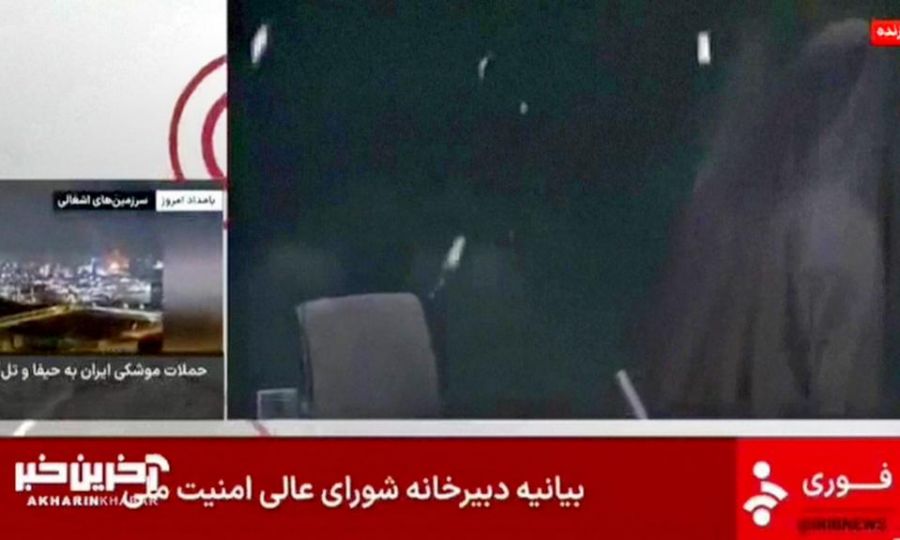An Israeli strike targeted Iran’s state broadcasting center on Monday, while the head of the U.N. nuclear watchdog reported significant damage to Iran’s largest uranium enrichment facility. Meanwhile, Iran called on the U.S. to pressure Israel to stop the ongoing air conflict.
Late Monday, Israel announced it had struck Iran’s broadcasting authority, and footage showed a news anchor abruptly leaving her seat as an explosion occurred. The Israeli military stated the building also functioned as a communications hub for Iran’s armed forces.
The conflict entered its fifth day on Tuesday, with air raid sirens sounding in Tel Aviv shortly after midnight as Iran launched further missile attacks toward Israel.
Iran’s Foreign Minister Abbas Araqchi told European counterparts that while Iran remains committed to diplomacy, its current priority is responding to aggression. Israel has stated its objective is to eliminate Iran’s nuclear weapons capability.
Iran reports over 224 fatalities, mainly civilians, while Israel confirms 24 civilian deaths.
Sources indicate that Tehran has urged Oman, Qatar, and Saudi Arabia to encourage the U.S. President to use his influence on Israel’s Prime Minister to push for an immediate ceasefire. In return, Iran is reportedly willing to show flexibility in nuclear negotiations.
Araqchi emphasized on social media that if the U.S. is serious about diplomacy and ending the conflict, decisive actions must follow. He insisted Israel must stop its attacks or Iran’s responses will continue, suggesting that a single phone call from Washington could restrain Israel’s leadership.
Asked about the prospect of talks, Israel’s Prime Minister stressed the country’s commitment to neutralizing the nuclear and missile threats, adding that a 60-day window had already been given for negotiations.
Earlier, the U.S. President said Iran had been given 60 days to halt uranium enrichment, but no deal was reached. Planned talks hosted by Oman were canceled after Iran refused to negotiate while under attack.
Iranian media reported preparations for the “largest and most intense missile attack” yet on Israel, targeting both military and intelligence sites.
Israel’s initial air campaign included a surprise strike that killed many of Iran’s top military leaders and nuclear scientists. The Israeli military claims control of Iranian airspace and plans to intensify the offensive.
Recent strikes damaged Iranian F-14 fighter jets at Tehran airport and have disabled at least two of the three operational uranium enrichment plants.
The head of the International Atomic Energy Agency reported that nearly all centrifuges at Iran’s main Natanz plant were likely damaged or destroyed following a power outage caused by the strike. In contrast, the Fordow facility sustained minimal damage.
For the first time in decades, Iran launched missile attacks that penetrated Israeli defenses in significant numbers, killing civilians in their homes. Continuous news coverage showed Israeli rescue teams working amid the rubble of destroyed houses.
Nearly 3,000 people have been evacuated, and 24 buildings are slated for demolition, according to Israeli officials.
In Iran’s capital, state television showed scenes of damaged government buildings, burned vehicles, and devastated streets. Many residents are attempting to flee, facing fuel shortages and cash shortages at banks.
One Tehran resident described the fear gripping his family amid constant explosions, saying they had nowhere to hide but under their dining table.
The U.S. President has repeatedly stated that the Israeli assault could end swiftly if Iran agrees to strict nuclear program limits. He expressed optimism that a deal would be reached, calling Iran “foolish” if it refuses to sign.
Meanwhile, some Iranian lawmakers have suggested withdrawing from the nuclear non-proliferation treaty, a move likely to complicate negotiations. Iran maintains its nuclear program is peaceful, though the nuclear watchdog recently declared Tehran in violation of its commitments.
Before dawn Monday, Iranian missiles struck cities including Tel Aviv and Haifa, killing at least eight and damaging homes. Iran’s Revolutionary Guards claimed their latest missile salvo used new tactics that confused Israel’s defense systems, allowing more missiles to penetrate.
In Israel, damage to a power station resulted in three deaths and forced refinery closures.
Oil prices fluctuated amid reports that Iran seeks a ceasefire, raising hopes of easing tensions and reducing risks to regional oil supplies.
The killing of so many Iranian military leaders and the loss of airspace control marks a critical challenge to Iran’s ruling system, the most significant since the 1979 Islamic Revolution.



